The aging process is one we are all seeking to delay for as long as possible. KEY Nutrition endeavours to holistically treat the body; from good nutrition to hormonal health and all factors in between. This is why we delve into the studies of Dr H Rensburg, bariatric physician and hormone specialist.
Dr Rensburg explains, in detail, why we age and also how to slow down the aging process as much as possible. This fresh look at hormones and how they can accompany a good balanced diet will equip you to making the most pro-active choices regarding your health.
It is strongly advised that you speak to your medical doctor before applying any protocols mentioned below.
Chrono-pause (time-delay)
Pineal insufficiency and failure: The pineal gland, producing Epithalin and Melatonin, is an excellent example of hormonal decline commencing the ageing process.
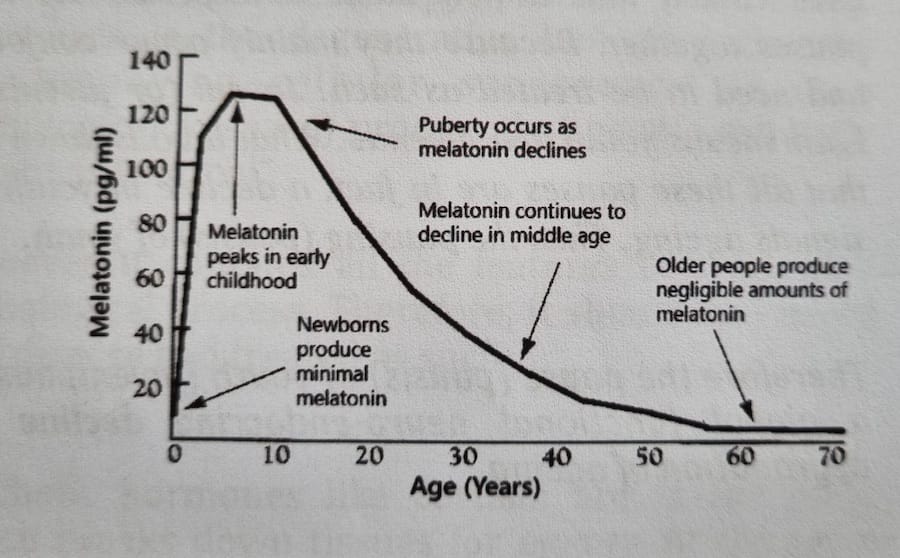
Melatonin production peak at age ten and then steeply decline + 95% from age 20 to 60
Meno-pause
Ovarian insufficiency and failure:
We usually hear a lot about menopause (Greek: men- is month), which means the ceasing (pausis in Greek) of the monthly cycles (menses) in women. However, I do not think the name is quite correct in describing the various stages of menopause. Since during the first stage, menses usually still occur and has therefore not ceased (pausis).
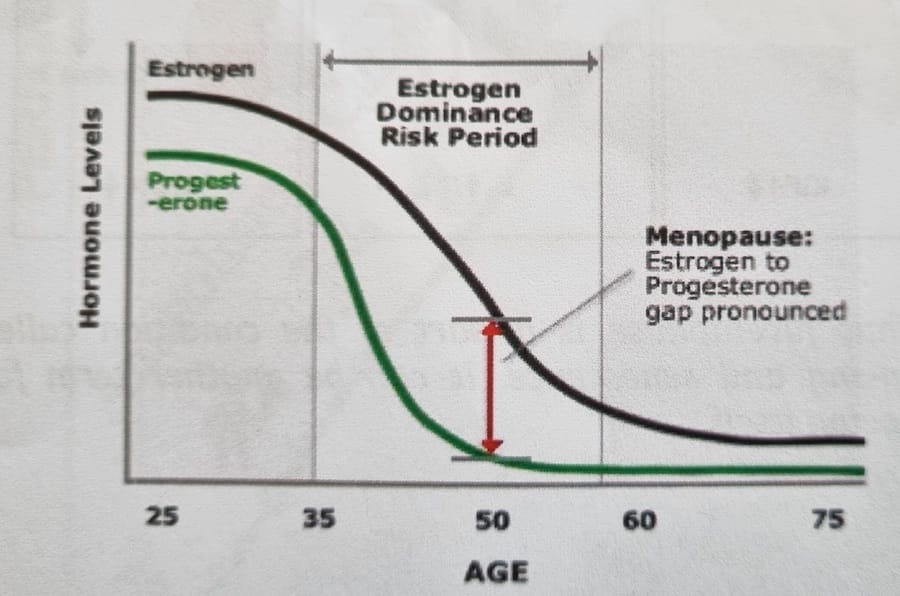
Oestrogen, progesterone and fertility can start to decline from as early as 35 years of age. Which technically commences the start of menopause.
There are three stages: (Important when it comes to treatment options)
1. From 35 to about 46 years, the mentioned hormones decline, leading to ovarian insufficiency. A woman can still fall pregnant: however, she often needs Progesterone to hold on to the pregnancy. This stage is commonly loosely called the peri-menopause. After that, some symptoms and signs of these declining hormone levels start to manifest.
2. From about 46 to 53 years the menses completely cease, due to ovarian insufficiency and often the symptoms can be quite debilitating. This is what most people understand what ‘menopause’ is.
3. From around 53 onwards, a woman gets used to and adapts to the symptoms. She is then considered to be in the post-menopause phase. Often women claim at this stage; they are “through menopause”.
Adreno-pause
Adrenal insufficiency or failure.
Some sections of the adrenals fail relatively early in life.
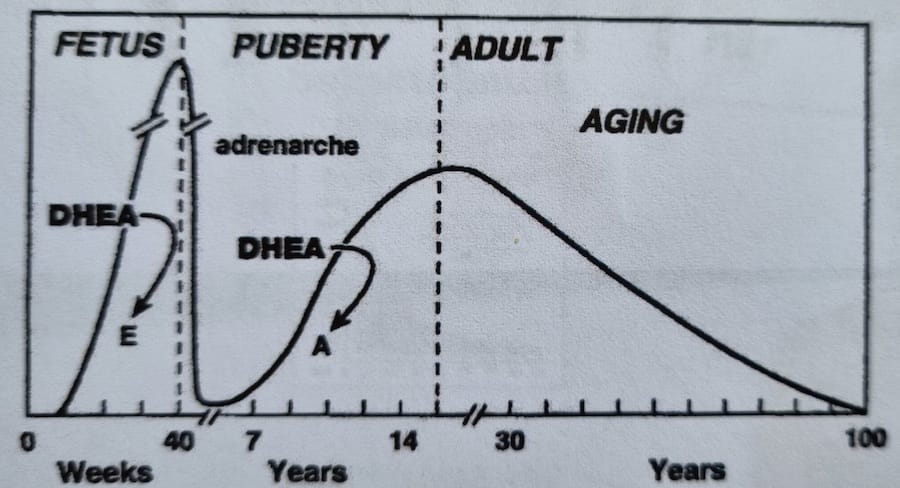
DHEA, by the age of 50, is only produced in half the quantity than at the age of 25. Pregnenolone and Cortisol also decline as the adrenals age.
Andro-pause
Testicular insufficiency or failure. Also called Viropause, the male climacteric or “male- menopause. However, the latter is incorrect since men do not have menses. Instead, they may become less interested in women due to declining androgens (testosterone, etc.).
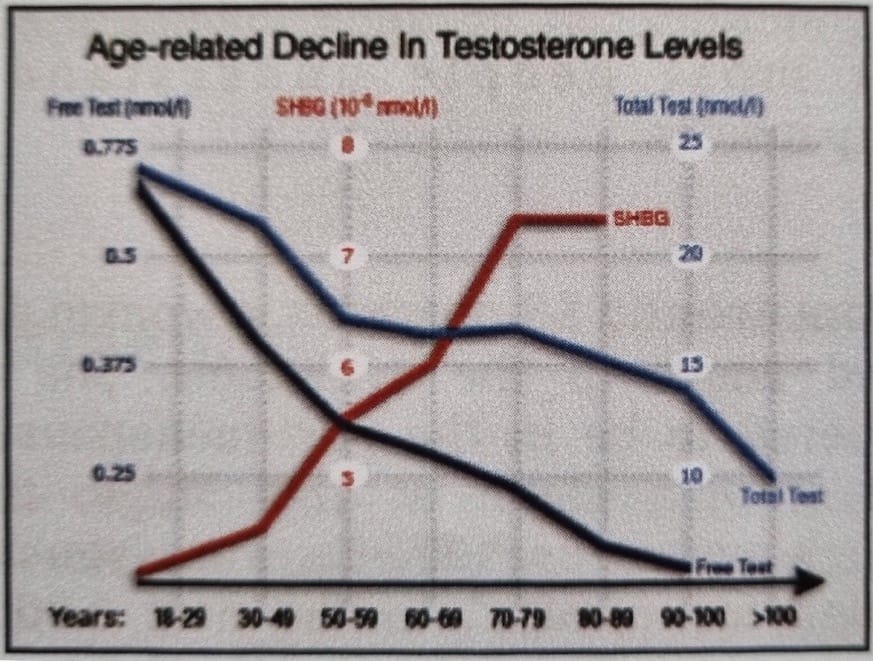
It usually starts with declining DHEA, followed by some abdominal fat gain, the subsequent decline in testosterone and fluctuating libido, and the grumpy old man syndrome.
Somato-pause
Lateral pituitary insufficiency or failure.
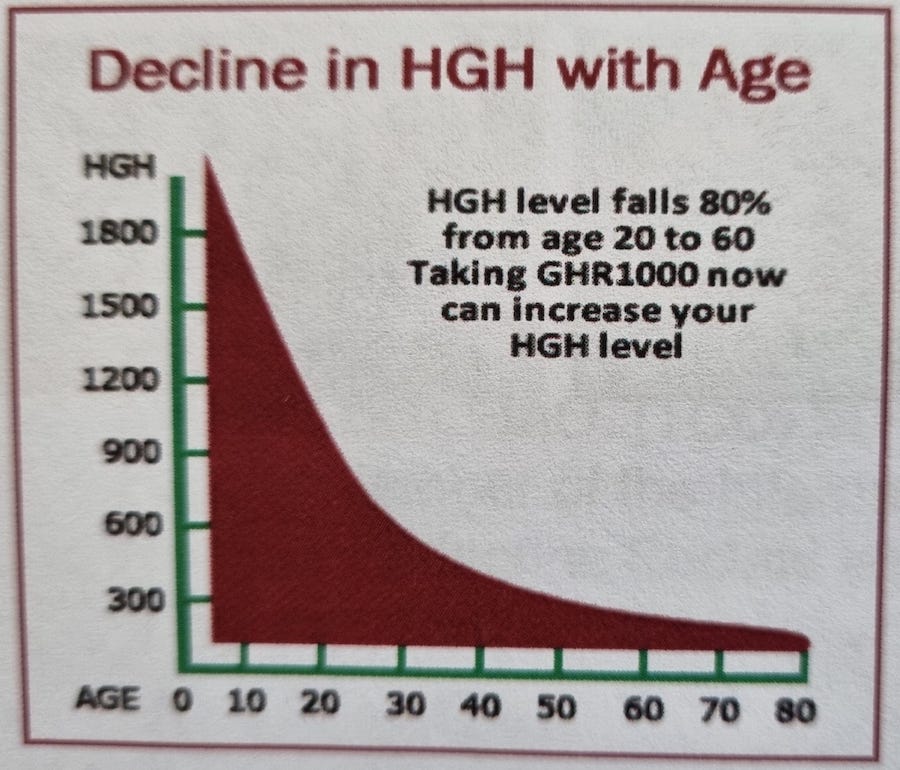
Somatropin (Growth Hormone GH) and IGF-1 levels decline beyond the youthful adult levels with numerous side effects, including quality of life, which is central to ageing.
Other endocrine failures and pauses with age include the thyroid gland, pituitary, thymus, and pancreas.
Neuroendocrine theory of ageing
The brain and pituitary age, especially the lateral pituitary, produces GH, which has a less stimulatory effect on the liver. Depending on the part of the endocrine system involved will lead to several distinct pauses.
Juveni-pause
With so many “pauses” around, the clinical situation, especially regarding treatment, can become confusing. I have thus coined a new name to describe all these pauses together. Because they mainly occur conjointly and need to be treated as such. Juveni (or juvenis) in Latin means youth and juvenile. What it boils down to is that all these pauses are in fact, a decline in youth and signals ageing. Thus the pausing of youth.
Therefore, the pause (pausis) of youth (juvenipause) is a global functional neuro-endocrine decline and degradation of ageing.
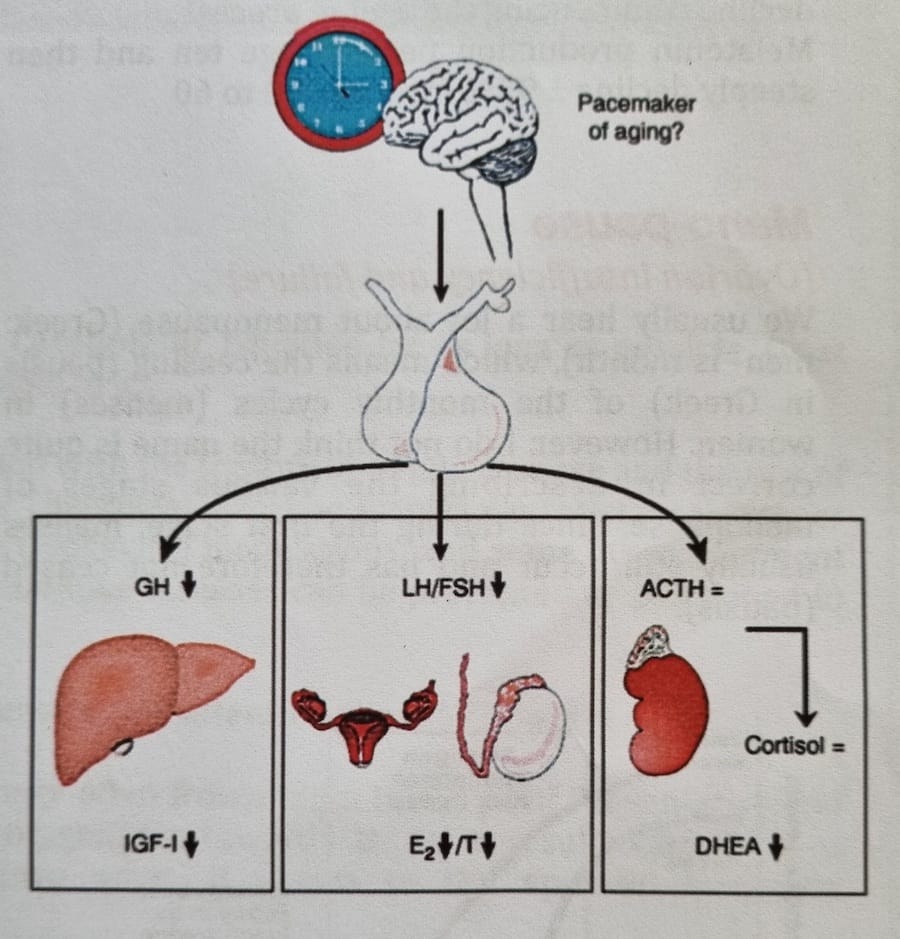
Thus Juvenipause is a part of the condition called ageing and senescence. It can be another term for ageing itself.
I prefer Juvenipause to anti-ageing. The latter is a commercial concept. Treating the ceasing of youth, in my opinion, better describes it and makes it easier to define associated clinical syndromes and work out treatment strategies.
A chain is just as strong as its weakest link. So if there are significant Adrenopause. Menopause, and Somatopause present, what do you treat? By only treating ‘menopause’ in this case, is like only topping up your engine oil if your petrol tank and brake fluid are empty too. Your car would not perform correctly. So, the treatment should be holistic.
Catabiosis
“Normal” ageing/juvenipause is a catabolic (breakdown) process. The medical name for ageing is Catabiosis. Youth, on the other hand, is an anabolic (building up) process (Anabiosis). Catabiosis is the degenerative biological changes accompanying cellular senescence. It is a pathological (disease) process that people generally regard as normal.
However, it contains all the features of a disease/pathological process. Therefore, it should be viewed as a disease and treated as such.
Catabolic hormones like cortisol are in the body, which breaks down tissues for energy. At the same time, various anabolic hormones like Insulin, Somatropin (GH), Testosterone, DHEA, etc, build up tissues.
Therefore to manage Juvenipause there needs to be a balance between Catabolism and Anabolism as close as possible.
Anablosis (Youth): Anabolism > Catabolism (Youth is an anabolic process)
Adulthood (Balanced): Anabolism = Catabolism (This lasts only a short few years)
Catabiosis (Ageing/Juvenipause): Anabolism < Catabolism (Juvenipause is a catabolic process)
The disease of Juvenipause/Catabiosis (Ageing) should be treated as a disease process to slow it down. Reversing Juvenipause, will be possible at some stage in the future. Watch this space.
If you live long enough, you will get old. Don’t worry about it – remember, many people are denied the privilege of getting old. However, treating Juvenipause and some lifestyle changes can significantly alleviate the adverse effects of the disease of ageing.
The only way to prevent the effects of Juvenipause (or old age) is to die young. On the other hand, the plan is to die as young as possible, as late as possible.
Therefore to manage Juvenipause there needs to be a balance between Catabolism and Anabolism. as close as possible.
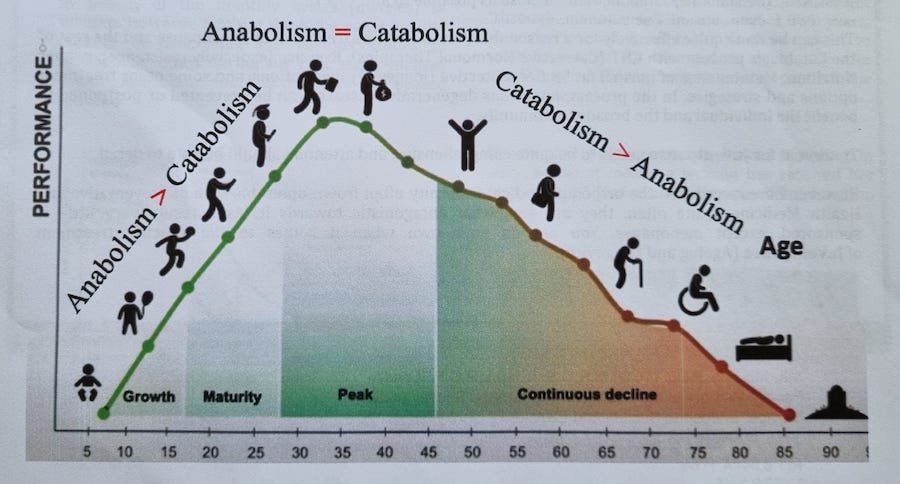
Decline of various hormones with ageing in % from age 20 to 60
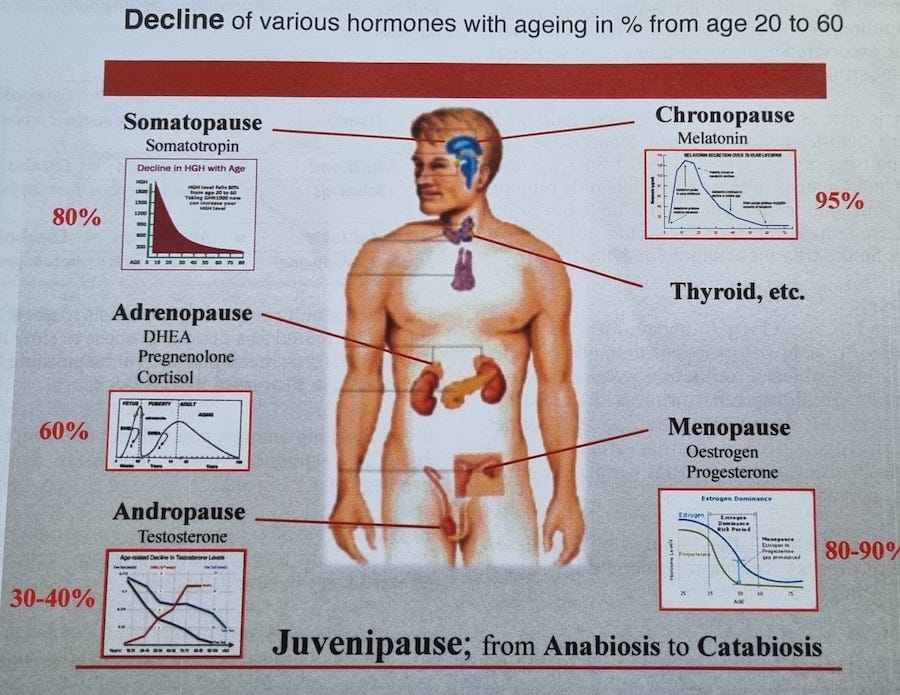
Treatment options
In adulthood, the goal is to extend the ‘Anabolism = Catabolism’ equation for as long as possible. Or at least, keep the anabolic/catabolic ratio as close as possible to it.
This can be done quite effectively for a reasonable period with the treatment of Jovenipause and the rest of the Catabiosis process with CHT (Corrective Hormonal Therapies), Exercise (especially resistance), proper Nutrition, Maintenance of normal fat %, Geoprotective (longevity) medications, and some other treatment options and strategies. In the process, numerous degenerative diseases can be prevented or postponed to benefit the individual and the broader community.
Treatment for Juvenipause needs to be quite comprehensive, and attention should be paid to detail. However, bureaucrats and the orthodox medical fraternity often frown upon this type of Preventative and Health Medicine. Quite often, they are somewhat antagonistic towards it. As a result, very little is sponsored, except menopause. You are on your own when it comes to the specific treatment of Juvenipause (Ageing and Longevity).
Dr. Hendrik in Rensburg MD
MA. MB.Bch, BAD. (TCD) M.R.C.S. (Eng) LRC.P. (Lond) Faculty Member of the International Hormone Society (IHS)
Member Endocrine Society and ESA
The Rensburg Medical Clinic





